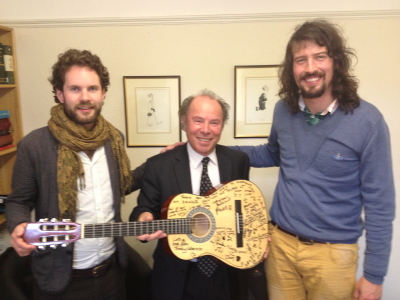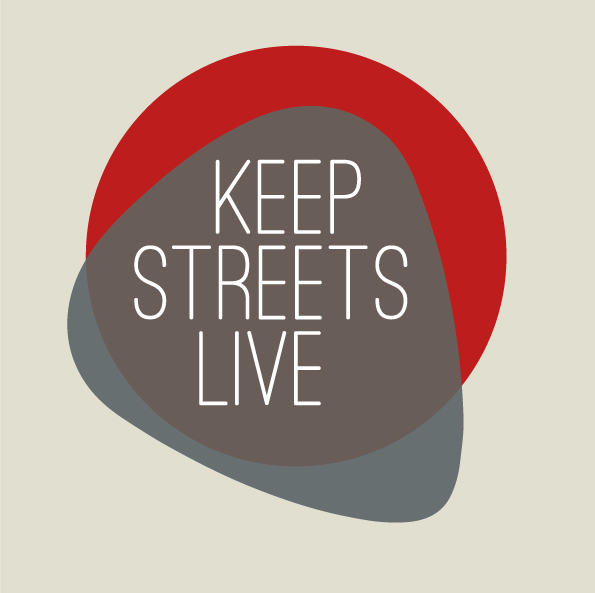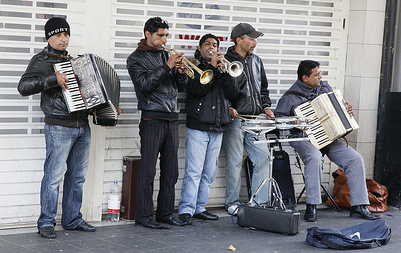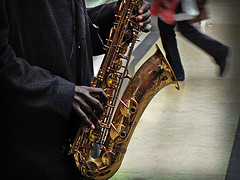Success for ASAP!’s Keep Streets Live campaign in Liverpool!

Christian and Jonny present David Kirwan, Senior Partner of Kirwan’s Soliciters, with a gift on behalf of street artists and performers in Liverpool whose livilihoods his public-spirited legal support has helped to safeguard.
(Cross-posted from The Association of Street Artists and Performers)
There is an autumnal chill in the air and the nights are drawing in, already the memories of summer are fading and winter looms ahead, a time when most buskers have to dig out their thermals and fingerless gloves. But despite the colder weather and the diminishing hours of sunlight, our spirits are high. More than three months after its introduction, and under threat of legal action initiated by the Keep Streets Live! campaign, Councillor Stephen Munby announced Liverpool City Council’s decision to abandon their contentious busking at a recent cabinet meeting. This climbdown is hugely welcome and highly significant. It demonstrates that a constructive campaign of opposition can make a difference, and represents a significant moment in the ongoing campaign to protect street culture. At long las common sense has prevailed. We hope that this council reversal represents the beginnings of a new culture of cooperation and compromise between street performers and the powers that be.
Early on into the campaign, Kirwans Solicitors offered pro bono legal support to our cause, and began a legal challenge which was instrumental in the policy’s downfall. David Kirwan, Senior Partner at the firm, described Liverpool’s scheme as “oppressive, irrational and disproportionate“. At our campaign’s invitation, Kirwans initiated a formal legal challenge in the form of a judicial review application on behalf of Liverpool busker Siobhan McDermott. We know that the legal pressure applied by Kirwans helped to focus the minds of the council, and hope that they will now abandon the use of coercive measures like threats of trespass prosecutions and restrictive license schemes. We look forward to helping them draw up a system which genuinely enhances city life, and doesn’t smother spontaneity with spirit-sapping regulations.
Nonetheless, there are still unanswered questions about the council’s attitude to our legal challenge. Why, for instance, did the council claim that they were always going to review the policy after a three month period? This claim is nowhere to be found in the notes from the cabinet agenda at which the policy was announced and talk of ‘internal reviews’ only emerged after the scheme came under heavy criticism from Keep Streets Live!. The legal challenge we launched by judicial review had to be done in the first three months of the scheme’s introduction or it would have been invalid. We think it is a little bit suspect that the proposed internal council review was to be after three months, precisely after a legal challenge would have been ruled out.
We are also disappointed that the Mayor of Liverpool is still maintaining that the policy was ‘lawful and reasonable’, despite the information that the Keep Streets Live! campaign helped bring to light, and the many contentious points we drew attention to (such as the Simon Cowell clause, threats of trespass prosecutions in public space, the unlawful ban on under-18s and the small issue that the 2003 Licensing Act was never intended to cover busking). The council are continuing to send out mixed messages about the real reasons they dropped the scheme. We hope they come to see just how unreasonable their proposals really were and how troubling were the implications for how our shared public spaces are managed. This will be particularly useful if any new policy that emerges from this episode is to have real credibility.
So how did we arrive at this victory? Beginning life as a petition, growing into a website, taken up by the large number of affected parties, and so ending, finally, in the High Court, the campaign could not have succeed without the generous input and dedication of a wide variety of people who lent their support over the course of the summer.
From the supportive members of the public who turned out en-mass on the streets of Liverpool for celebratory busks to help raise awareness for the campaign, to the devoted members of our legal team, to the many individual buskers and performers who wrote and spoke out with passion and eloquence about the injustice of the council’s decision, people from all walks of life came together in a common effort to stand against an unfair decision. We owe a debt of gratitude to the thousands who signed the petition, to the street performers who turned up to the celebratory busks against the policy, to those who took photographs and made videos, designed websites and flyers, or lent their supportive presence to our various events, to sympathetic members of the public and supportive voices in the cultural and artistic communities of the city, to our dedicated and tenacious legal team, and those journalists who took the time to uncover the real issues at stake in Liverpool. We could not have achieved this without you.
To date, the campaign has attracted coverage from online, print, radio and television media outlets. Early on the Musician’s Union gave us their support and offered to help Liverpool City Council draft a fairer street performance system. This was enormously helpful. The staff at Change.Org also provided valuable advice and insight throughout the campaign.
Liverpool’s restrictive policy on street entertainment touched on many wider issues, and these issues are not going away. What, for example, are our public spaces for? Who are they for and who decides what happens in them? To what extent should narrow private interests be allowed to dictate public policy, in other words? All these questions touch upon the basic issue of what we want our streets to be like.
Street artists and performers are just one group amongst many different users of our shared public spaces. We could also mention political activists, street evangelists, shoppers, skateboarders, street traders and many, many more. All have their unique part to play in the tapestry of our shared urban lives. We agree with Mary Portas when she says in her well-publicised report that
Our high streets can be lively, dynamic and social places…that give a sense of belonging and trust to a community1
We believe that street art and performance adds colour and life to our public spaces and needs to be encouraged and protected.
What Next?
The Association of Street Artists and Performers (or ASAP! for short)will continue campaigning for a vibrant street culture, and will stand against burdensome and unduly restrictive regulations whether in Liverpool, or elsewhere. ASAP! is a movement for all who have a shared interest in street art and performance, and who value our shared public spaces as places of community, interaction, diversity and spontaneity. We wish to draw our membership widely and work alongside all those who care about street culture. As long as you share our values and are in agreement with our aims, we are happy for you to call yourself an ASAP! member, and we are here to help and support you. There is no charge for membership, although we are preparing information packs that will carry a small charge to cover our admin costs to send out.
If you would like to join ASAP! please fill in this form, add a few words about yourself (if you wish), and we will be in touch.
Until then, Keep Streets Live!
Footnotes
- http://www.communities.gov.uk/documents/regeneration/pdf/2081646.pdf, pp.3 ↩





